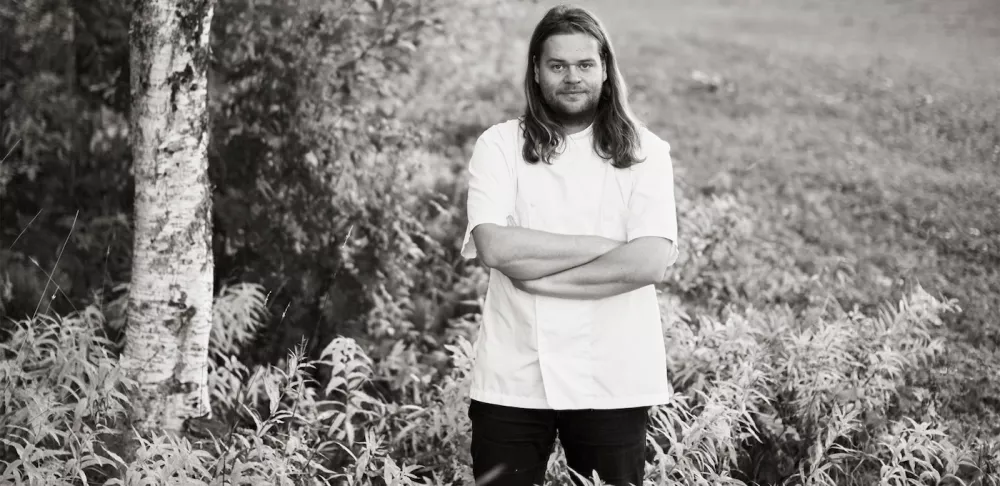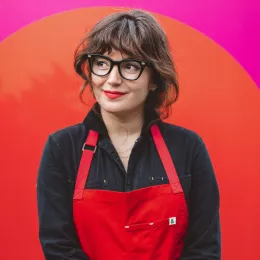In 2008, 24-year-old Chef Magnus Nilsson took the helm of a 24-seat restaurant called Fäviken in Sweden. By 2012, his 30-course menu earned the remote restaurant a spot on the World’s 50 Best list and in 2016 it gained two Michelin stars. Chef Magnus was featured on Netflix’s “Chef’s Table” and “Mind of a Chef” before closing the restaurant in late 2019 and joining Chef Rene Redzepi’s MAD foundation.
As the director of the MAD Academy, Chef Magnus leads programming, promoting leadership and important industry topics like sustainability. On the heels of releasing his recent tome, “Fäviken: 4015 Days, Beginning to End,” the chef and author joined the Institute of Culinary Education for a live stream discussing culinary creativity, hospitality and the future of the restaurant industry with students and alumni. Here are some of Chef Magnus’ insights paraphrased from the virtual event.
On creating a sense of place:
You can't run a restaurant that doesn't relate to wherever it's located. That doesn't mean that you can run a restaurant that has a very distinctive style that relates to someplace else as well. But it is almost impossible to actually do something that's completely detached from its surroundings. For reasons of quality, it just made much more sense to work with locally forged relationships, the people that you can meet and get to know, to get access to super good produce.
That path eventually evolved into one where I decided to only work with produce from certain producers and certain areas and limit myself like that, even if it was an imaginary limitation in a sense because it's self-imposed. I could buy anything that any other restaurant in the world would be able to buy, as long as I paid for it, and have it flown in. But by choosing not to do that, by imposing limitation, you create really interesting circumstances for creativity to happen when you are forcing yourself to think in new ways, finding new fashions to create expressions of food.
On the creative process:
In 2012 or 2013, I stumbled upon this book about creative philosophy and creative theory. Something that I'd never heard about before. It really resonated with me. I immediately recognized a lot of the things that this book described as things that have happened to me in my creative process. I realized that creativity is not magic, it can feel sometimes like sorcery that things just materialize from nothing — an idea comes without any prior background. The truth is that that's never the case.
The creative process is really a subconscious process in the human mind that utilizes everything that we have with us, all of the different experiences that we've collected through our lifetime. Every little bit and every little piece of something that we perceived will be part of that process, whether you want it or not. The way that you can engage with this is that you can make sure that you fill that toolbox up and approach life in a way where you try to experience things without bias. That you, by choice, expose yourself to situations that are new and therefore, perhaps, interesting. That's actually much more difficult than it sounds.

On forging a culinary career path:
One of the most important things to consider is that cooking is a craft and the only way to learn a craft is by practicing it. The way that hospitality is set up today, and especially in the more ambitious parts, is that the better you are at what you're doing early on in your career, the faster you will be pulled out of the practicing of the craft, which is totally backwards and it's an incredibly destructive system. That's something that students coming out into their first work-life experience have to bear with them and have to withstand and hold back from, I think. You shouldn't, just because you happen to have talent and be good at something, move on too quickly.
I would really, really hope that people do more of in the future is to find good and engaged employers to work for, and then stay there, not forever, but for long enough so that those employers can feel a true commitment towards their employees and teach them.
On his most memorable dining experiences:
What stands out always is the human connection. Because once again, that's something that you can't share, you can't share it online, you can't replicate that. It's the interaction between two human beings in a room. It is something that's truly unique. The visits that meant the most to me have almost nothing to do with how expensive they were, how excited I was to visit them beforehand, how difficult it was to get the reservation or whatever, almost nothing with that. What you truly remember is: Did it feel as if someone cooked for me? Did it feel like the people in the dining room were there for the good of me? That's what you remember in the end.

On what makes a good leader:
I don't think there is one single defining factor, but one thing that's really important is that you have to understand yourself. You have to achieve a certain level of maturity and some people have that much earlier on than others. You need to understand how you interact with others and how that interaction affects the team that you're supposed to lead or work with.
That's really, really quite difficult. It took me many years before I started being better at the craft of management. That's also one of the reasons why I said yes when I was asked to do the job that I do now. Because I felt that it makes no sense that it should have to take someone five or six years, as it took for me, of trial and error at a fairly significant emotional cost for everyone involved before you get to the point where you start to understand how you're supposed to do these things. In most other industries, there are systems in place. Which doesn't mean that they are perfect either, but there are systems in place to accelerate this development and to prepare people much earlier on for what it means to be a leader or a manager.
On staff sustainability and work-life balance:
It makes no sense that someone who works in a restaurant shouldn't be able to expect the same work-life balance, for example, as the people who eat in the restaurant. That straight comparison can always be used. It often showcases how our industry has been set up in the past. I also must say that it has gotten a lot better. I think that we're on an accelerating curve now. As long as enough of us decide that this change is worthwhile, we can further accelerate it. As long as the people who are coming into hospitality now already know from the beginning that they have the same right to expect the same quality of life and work-life balance, salary development, all of these other measurable factors as any other industry and any person coming into the restaurant to eat. As long as they always carry that with them from the very beginning and use that as a measuring stick for where they're going to work, we can really make a difference.
On the future:
As a culture and as a bearer of culture, restaurants are incredibly resilient. We can see that through a lot of historical crises as well that restaurants come back. That’s one of these things that I've thought a lot about during the last six months being without the restaurant, being able to observe this from the sidelines in a way that I wouldn't have been if I had a restaurant. A lot of people are pushing a narrative saying that restaurants are going away and they're never coming back. I don't believe in that. I don't buy that because even if restaurants are closing now and many of them won't be open again, we’re still going to have lots of spaces that are suitable for running restaurants in, we're going to have plenty of people who are really good at running restaurants, who are going to want to run new restaurants. We're going to have plenty of people who are good at working in restaurants who are going to want to work in restaurants again. Most importantly, do you think after this, that people are going to go out to eat less or more when we've been deprived of such a human and an important thing for such a long time? I think more if anything.
Attending MAD Academy:
The Institute of Culinary Education is offering a scholarship to any of the MAD Academy's Spring 2021 programs. ICE alumni can apply here by January 25, 2021.
See upcoming virtual events and explore your own culinary career path.




